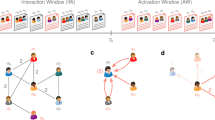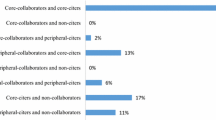Abstract
Collaboration is believed to be influential on researchers’ productivity. However, the impact of collaboration relies on factors such as disciplines, collaboration patterns, and collaborators’ characters. In addition, at different career stages, such as the growth or the establishment career stages of scientists, collaboration is different in scale and scope, and its effect on productivity varies. In this paper, we study the relationships between collaboration and productivity in four disciplines, Organic Chemistry, Virology, Mathematics and Computer Science. Our study found that the productivity is correlated with collaboration in general, but the correlation could be positive or negative on the basis of which aspect of collaboration to measure, i.e., the scale or scope of the collaboration. The correlation becomes stronger as individual scientists progress through various stages of their career. Furthermore, experimental disciplines, such as Organic Chemistry and Virology, have shown stronger correlation coefficients than theoretical ones such as Mathematics and Computer Science.






Similar content being viewed by others
References
Beaver, D. B. (1979). Studies in scientific collaboration: part II. Scientific co-authorship, research productivity and visibility in the French scientific elite, 1799–1830. Scientometrics, 1(2), 133–149.
Beaver, D. B., & Rosen, R. (1978). Studies in scientific collaboration: part I. The professional origins of scientific co-authorship. Scientometrics, 1(3), 65–84.
Birnholtz, J. P. (2007). When do researchers collaborate? Toward a model of collaboration propensity. Journal of the American Society for Information Science, 58(14), 2226–2239.
Bonaccorsi, A., & Daraio, C. (2003). Age effects in scientific productivity: The case of the Italian National Research Council (CNR). Scientometrics, 58(1), 49–90.
Bozeman, B., & Corley, E. (2004). Scientists’ collaboration strategies: Implications for scientific and technical human capital. Research Policy, 33(4), 599–616.
Corley, E. A., & Sabharwal, M. (2010). Scholarly collaboration and productivity patterns in public administration: Analysing recent trends. Public Administration, 88(3), 627–648.
Costas, R., & Van Leeuwen, T. N. (2010). A bibliometric classificatory approach for the study and assessment of research performance at the individual level: The effects of age on productivity and impact. Journal of the American Society for Information Science, 61(8), 1564–1581.
Cummings, J. N., & Kiesler, S. (2007). Coordination costs and project outcomes in multi-university collaborations. Research Policy, 36(10), 1620–1634.
Defazio, D., Lockett, A., & Wright, M. (2009). Funding incentives, collaborative dynamics and scientific productivity: Evidence from the EU framework program. Research Policy, 38(2), 293–305.
Dietz, J., & Bozeman, B. (2005). Academic careers, patents, and productivity: Industry experience as scientific and technical human capital. Research Policy, 34(3), 349–367.
Ding, W. W., Levin, S. G., Stephan, P. E., & Winkler, A. E. (2010). The impact of information technology on academic scientists’ productivity and collaboration patterns. Management Science, 56(9), 1439–1461.
Duque, R. B. (2005). Collaboration paradox: Scientific productivity, the Internet, and problems of research in developing areas. Social Studies of Science, 35(5), 755–785.
Franceschet, M., & Costantini, A. (2010). The effect of scholar collaboration on impact and quality of academic papers. Journal of Informetrics, 4(4), 540–553.
He, Z.-L., Geng, X.-S., & Campbell-Hunt, C. (2009). Research collaboration and research output: A longitudinal study of 65 biomedical scientists in a New Zealand university. Research Policy, 38(2), 306–317.
Hsu, J., & Huang, D. (2010). Correlation between impact and collaboration. Scientometrics, 86(2), 317–324.
Jansen, D., Görtz, R., & Heidler, R. (2009). Knowledge production and the structure of collaboration networks in two scientific fields. Scientometrics, 83(1), 219–241.
Katz, J. S., & Martin, B. R. (1997). What is research collaboration? Research Policy, 26(1), 1–18.
Landry, R. (1998). The impact of transaction costs on the institutional structuration of collaborative academic research. Research Policy, 27(9), 901–913.
Lee, S., & Bozeman, B. (2005). The impact of research collaboration on scientific productivity. Social Studies of Science, 35(5), 673–702.
Liang, L., Kreschmer, H., Guo, Y., & Beaver, D. deB. (2001). Age structures of scientific collaboration in Chinese computer science. Scientometrics, 52(3), 471–486.
Link, A. N., Paton, D., & Donald, S. S. (2002). An analysis of policy initiatives to promote strategic research partnerships. Research Policy, 31(8–9), 1459–1466.
Perkmann, M., & Walsh, K. (2009). The two faces of collaboration: Impacts of university-industry relations on public research. Industrial and Corporate Change, 18(6), 1033.
Porac, J. (2004). Human capital heterogeneity, collaborative relationships, and publication patterns in a multidisciplinary scientific alliance: A comparative case study of two scientific teams. Research Policy, 33(4), 661–678.
Powell, W. W. (1998). Learning from collaboration: Knowledge and networks in the biotechnology and pharmaceutical industries. California Management Review, 40(3), 228–240.
Pravdi, N., & Olui -Vukovi, V. (1986). Dual approach to multiple authorship in the study of collaboration/scientific output relationship. Scientometrics, 10(5), 259–280.
Savanur, K., & Srikanth, R. (2009). Modified collaborative coefficient: A new measure for quantifying the degree of research collaboration. Scientometrics, 84(2), 365–371.
Sooryamoorthy, R. (2009). Collaboration and publication: How collaborative are scientists in South Africa? Scientometrics, 80(2), 419–439.
Super, D. E. (1980). A life-span, life-space approach to career development. Journal of Vocational Behavior, 16(3), 282–298.
Yoshikane, F., Nozawa, T., Shibui, S., & Suzuki, T. (2008). An analysis of the connection between researchers’ productivity and their co-authors’ past attributions, including the importance in collaboration networks. Scientometrics, 79(2), 435–449.
Yoshikane, F., Nozawa, T., & Tsuji, K. (2006). Comparative analysis of co-authorship networks considering authors’ roles in collaboration: Differences between the theoretical and application areas. Scientometrics, 68(3), 643–655.
Author information
Authors and Affiliations
Corresponding author
Rights and permissions
About this article
Cite this article
Hu, Z., Chen, C. & Liu, Z. How are collaboration and productivity correlated at various career stages of scientists?. Scientometrics 101, 1553–1564 (2014). https://doi.org/10.1007/s11192-014-1323-6
Received:
Published:
Issue Date:
DOI: https://doi.org/10.1007/s11192-014-1323-6




